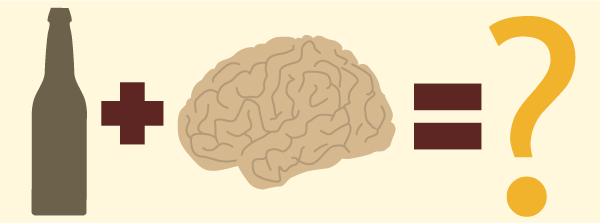Study: Drinking up to 5–8 glasses of wine or beer a week not seen to increase dementia risk
 ___
___
There may be a link between alcohol and dementia, but it’s complicated (Popular Science):
“A recent article in the British Medical Journal has rekindled the scientific argument over the relationship between abstaining from alcohol and developing dementia. The study involved 9,000 civil servants working in London, all of whom were aged between 35 and 55 when the study began between 1985 and 1988. When the study ended in 1993, their average age was 50. The participants’ medical records were analyzed to identify diagnoses of dementia—more than 23 years, on average, after the study had finished. The results found that abstinence in midlife was associated with a 45% higher risk of developing dementia, compared with people who consumed between one and 14 units of alcohol per week … The findings for those who drank above the recommended 14 units a week were perhaps less surprising. For every seven unit per week increase above 14 units there was a significant 17% increase in the risk of dementia … We should also be aware that between one-quarter and two-thirds of older people start drinking more than the recommended 14 unit limit for the first time after the age of 60.”
Note: 14 units of alcohol means 5–8 glasses of wine/ beer, depending on size and strength. The full description is: 14 single measures of spirits (ABV 37.5%); seven pints of average-strength (4%) lager; nine and one-third 125ml glasses of average-strength (12%) wine; seven 175ml glasses of average-strength (12%) wine; four and two-thirds 250ml glasses of average-strength (12%) wine.
The Study:
Alcohol consumption and risk of dementia: 23 year follow-up of Whitehall II cohort study (British Medical Journal):
- Objective: To examine the association between alcohol consumption and risk of dementia.
- Design: Prospective cohort study.
- Main outcome measures: Incident dementia, identified through linkage to hospital, mental health services, and mortality registers until 2017. Measures of alcohol consumption were the mean from three assessments between 1985/88 and 1991/93 (midlife), categorised as abstinence, 1–14 units/week, and >14 units/week…
- Conclusion: The risk of dementia was increased in people who abstained from alcohol in midlife or consumed >14 units/week. In several countries, guidelines define thresholds for harmful alcohol consumption much higher than 14 units/week. The present findings encourage the downward revision of such guidelines to promote cognitive health at older ages … Taken together, these results suggest that abstention and excessive alcohol consumption are associated with an increased risk of dementia, although the underlying mechanisms are likely to be different in the two groups. Overall, no evidence was found that alcohol consumption between 1 unit/week and 14 units/week increases the risk of dementia.
The Study in Context:
- For a good night’s rest, combine general sleep hygiene with mindful and cognitive techniques
- Solving the Brain Fitness Puzzle Is the Key to Self-Empowered Aging
- Six tips to build resilience and prevent brain-damaging stress
- 20 Must-Know Facts to Harness Neuroplasticity and Improve Brain Health
- Report: 35% of worldwide dementia cases could be prevented by modifying these 9 modifiable risk factors


